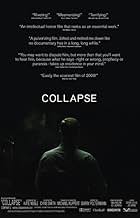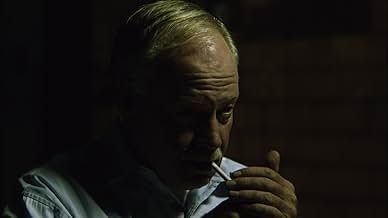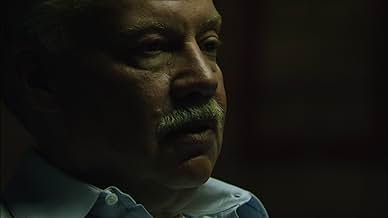A documentary on Michael Ruppert, a police officer turned independent reporter who predicted the current financial crisis in his self-published newsletter, From the Wilderness.A documentary on Michael Ruppert, a police officer turned independent reporter who predicted the current financial crisis in his self-published newsletter, From the Wilderness.A documentary on Michael Ruppert, a police officer turned independent reporter who predicted the current financial crisis in his self-published newsletter, From the Wilderness.
- Director
- Writer
- Star
- Director
- Writer
- All cast & crew
- Production, box office & more at IMDbPro
Featured reviews
Collapse is an amazing documentary that works on several levels. We'll start with the first: Ruppert's analysis of the world around us is stunningly bleak. Our entire civilization is based on oil. This is fact. All transportation requires oil in some form. All manufacturing (and civilization as we know it) is based on energy, which is finite, and requires some oil in some form. Building the resources to harvest ANY energy source requires manufacturing and transportation, which requires oil. Cultivating food requires energy to produce and transportation to get to your grocery store or home. Even if we discover some new energy source - algae, for example, which is not addressed in the film - all the components needed to harvest or utilize that energy are oil-based. Even if we invent cars without tires (which require 8+ barrels of oil to make, PER TIRE), the plastics and metals and components in those vehicles all require oil as either a direct ingredient or as an indirect part of the manufacturing.
Now imagine a world without oil. See where this is going?
This film, and Ruppert, go much further than that. Oil dependency is just the appetizer. Then we get to Peak Oil (or the Hubbert Peak). Then an economy based on floated, imaginary, (fiat) money. And so on. Ruppert builds his case with hysterically grim anecdotes and considerable authenticity. It's difficult to disagree with him precisely because he doesn't allow 'theory' or partisan/ideological opinion to seep into the discussion. The facts are accurate. The conclusions... are up to you.
Let's talk about the film-making itself: Chris Smith's film is shot 'bunker-style' for effect. It works. There are hardly any miscues in the technical aspects, and the editing style is absolutely riveting and never boring. As pure entertainment, if we can call it that, this film will absolutely command your attention for 80 minutes. The film does not subscribe - one way or another - to Ruppert. It just shows him as he is and allows you to draw your own conclusions. Right or wrong, Ruppert's quest to seek this knowledge and tell it to the world has subtly destroyed him. Collapse works on an intensely personal level, too. This film burns itself into the mind. It's point blank brilliant.
Others have noted a major flaw in Ruppert's arguments, including the filmmaker himself: Ruppert does not allow for miracles or human ingenuity in his apocalyptic scenarios. Ruppert has already decided we've passed the point of no return and is now looking to "build the lifeboat on the Titanic". When confronted about this directly, Ruppert's non-answer more or less says that he won't trust his fellow humans to think a way out of this. Ruppert has so expertly identified the problems, but he has no answers. All his "hope" is directed at ways to survive what's to come. Again, right or wrong, this man absolutely believes what he's saying and is absolutely terrified. You should be, too.
What's the way out? Well, I personally choose to believe the first part of Ruppert's argument and disregard the second. We are in trouble. But I choose to have faith in my fellow man, that we can "fix the Titanic" before it's too late. In the meantime, you must see this film. See it, soak it in, let it shake you, and tell your friends. Draw your own conclusions. Ruppert's role is to sound the warning. Perhaps if enough people see this film, someone out there will figure out what to do.
However, gloomy is one thing. Being deadly accurate in nearly all predictions is another thing altogether. Ruppert, and his team at From the Wilderness (his newsletter) have been bang on the money when it came to oil prices, housing prices, and of course the collapse of the US housing market, and in other areas as well including drugs, the CIA and 9/11 itself. Ruppert being an ex LAPD narcotics officer who was born into an intelligence family, has had experience in seeing truth where others bury their heads in the sand. When he tried to bring to light evidence that the CIA was dealing drugs within the USA, he was shot at and forced off of LAPD. This was only the beginning of his investigative career, and of the vicious repercussions he suffered because of it. In November of 2004, his book "Crossing the Rubicon: The Decline of the American Empire and the End of the Age of Oil" went largely unnoticed, even though it could serve as a final nail in Dick Cheney's political coffin concerning his culpability for 9/11. Ruppert has said, "This is a book that I, as a detective, would... drop in the lap of a DA and say, 'I want a filing for murder, premeditated, first degree, multiple counts with special circumstances." The best part: he makes no mention of bombs in buildings, or holes in the pentagon, or molten metal, but merely treats the case as another crime to be pieced together and solved. His conclusions are staggering.
And in light of this, to hear what he predicts is yet to come is guaranteed send a chill down your spine, even if you don't believe him. And what does he predict? Nothing short of the collapse of industrialized civilization itself. How could this ever happen? Quite simply, the world runs out of oil. Since everything we do is dependent upon oil... well it's probably best if I let Ruppert speak for himself.
The film plays like one of Ruppert's more impassioned talks, albeit with some cinematography added in to keep the eye amused. We are in an undefined space that looks like a bunker, or an interrogation room. Ruppert sits in a chair, smoking cigarettes (presumably to calm his nerves, or as he's been known to say "I smoke as many cigarettes as I want to, but not nearly as many as the movie would have you believe") and tells us what's on his mind. And by the time you're done seeing "Collapse" it'll be on your mind too... no matter how hard you try not to believe it.
What makes "Collapse" so much more powerful than the angry rants and shenanigans of Michael Moore is that while Moore may be passionate about what he's talking about, it's clear that Ruppert is more than passionate... he's scared to death. What's worse, and also unlike Moore who has received greater publicity than many fiction filmmakers, Ruppert has suffered from a kind of Cassandra syndrome for sometime. His writings and speeches are prophetic and yet, until recently, he has gone mostly unnoticed by the majority of people. Despite this, he's cracked open some of the biggest cases of all time: the CIA dealing drugs, empirical evidence that Dick Cheney was directly responsible for thousands of deaths on 9/11, and most recently, the collapse of the global housing market. It's not difficult to picture a similar but more ancient voice shouting "Don't let the horse through the gates of Troy! It will bring ruin!" only to be met with violence and humiliation.
As is true with so many visionaries, Mike Ruppert is just now beginning to be heard... and like so many useful visions, the realization is coming too late.
Essentially what this film does is the equivalent of getting stuck at a bus stop listening to a guy who is convinced that the world is going to come to an end and that "they" are just keeping us in the dark for some reason. I don't mean this as negatively as it sounds but it is fair to say that this film doesn't hide the fact that at times Ruppert gets carried away with himself, doesn't always cope well with having the totally open stage that he has in the interview, gets passionate, is obsessive and does happen to make statements that (out of context) come off as paranoid and doomsday in nature. It is also fair to say that, unless you already share his mindset, that there will be several times during the film where he goes further than you will be willing to go or says things that either don't make sense, seem like a stretch or that you just plain disagree with.
Mostly the film lets him talk so it is only fair that these moments are left in the film because it does let us see that, being frank, Ruppert is obsessive and that perhaps some of what he says is exaggerated and extreme but this is not to say that he is 100% wrong. So while I personally don't agree with him on the imminent nature of the collapse of the oil reserves (or that they are significantly smaller than "they" are telling us), one cannot really argue that from plastics to fuel, we really have put all our eggs into the "oil" basket and that supplies are simply not infinite. Likewise, because all of our eggs are in one place, moving them may well be possible in small numbers but if we suddenly have no basket – we're going to have a load of broken eggs. At this level the film is engaging and provides plenty to think about and I think that Ruppert is at his best when he is talking generally because his basic points are hard to argue; it is only when he gets into specifics or gets tied up in details that he begins to say "they" too often or get a bit more emotional.
These moments hurt the film by hurting him, although in fairness since the documentary is technically about him, then it is all part of the film and is a good bit of balance. So yes, Collapse will lose you at some point but it will also engage you at many more; it isn't the most factual of documentaries nor is it the best in terms of structure but I found it mostly very engaging and it sent me onto news sites and opinion sites on the internet to read up on some of the less "opinion" related "facts" that it Ruppert presents. Worth seeing for its faults because it is engaging and provides much to think about, even if your conclusions may not lie as far out there as Ruppert's.
I would surely say - the most important movie for the 21st century man.
We live in a fairytale where everybody has a hope that the ''good'' will overcome the ''evil'' no matter how bad it is, because it will be better... in the end that's the way fairy tales end, don't they? The ugly truth is that no magical wonderland exists, there is only now and here and this movie shows you WHAT ACTUALLY IS NOW AND HERE.
I would like to have had more info on a lot of his quotes but I guess that would likely take an 80 minute documentary into like 3 or 4 hours (which I wouldn't have minded). I might just buy some if his books to take a look to see how much more in depth he gets on most of the topics he covers in this documentary.
For me, watching this, it was like it's about time. What I mean by that is finally someone who doesn't come across as a street corner preacher or a bona fide nut. This guy is just talking about real issues that matter, or at least they should matter.
Did you know
- TriviaAccording to director, Chris Smith, they initially agreed the primary subject was supposed to be the CIA's connections to drug smuggling within the Iran-Contra affair, specifically Ruppert's collaboration with Pulitzer Prize-winning reporter Gary Webb's mid-1990's investigative series, "Dark Alliance." But Ruppert didn't want to talk about the CIA. Instead, he wanted to talk about peak oil, and its critical implications for the future.
- Quotes
Michael Ruppert: It's kind of sad because we as a species have become so disconnected from the Earth. We don't have any real contact with the Earth. We don't have any sense of its functions, its feeling, its seasons, its timings.
- ConnectionsReferenced in Film Junk Podcast: Episode 235: TIFF Report, Part 1 (2009)
- SoundtracksCollapse
Performed by Karli Larsen, Didier Leplae, Joe Wong
- How long is Collapse?Powered by Alexa
Details
Box office
- Gross US & Canada
- $46,964
- Opening weekend US & Canada
- $7,800
- Nov 8, 2009
- Gross worldwide
- $46,964
- Runtime
- 1h 22m(82 min)
- Color






